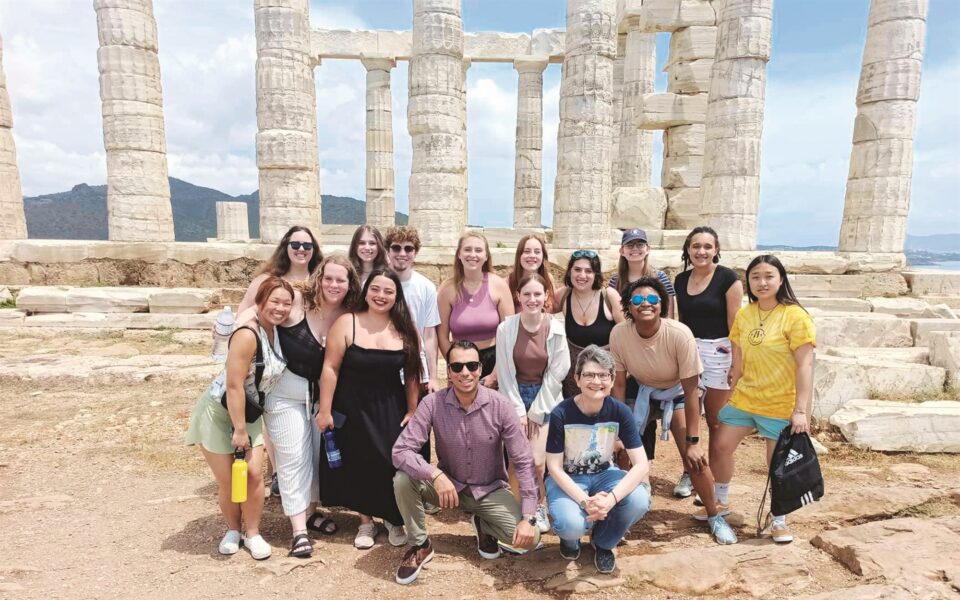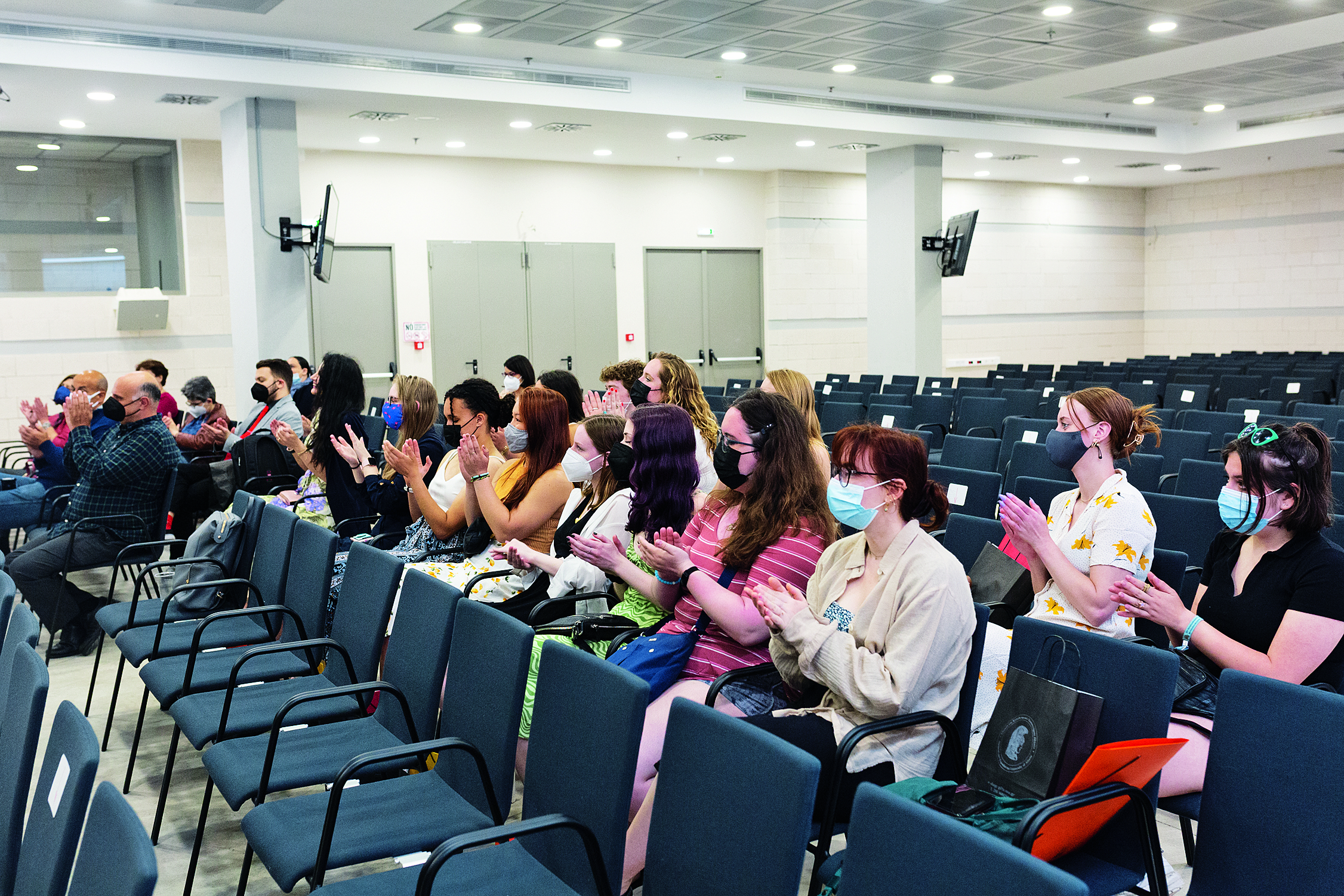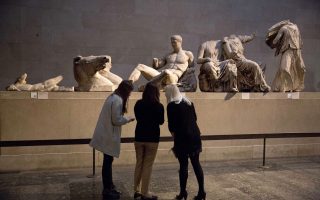Study in Greece building international bridges
Summer school programs gaining momentum and forging cultural and educational ties between universities around the world

Charlotte Smith was in elementary school when she first heard about Greece, reading Rick Riordan’s tales about the boy-hero Percy Jackson, inspired by Greek mythology. “I dreamed of traveling to your country ever since then,” the now 20-year old Boston University student tells Kathimerini.
Smith is here today with a summer school program organized with the University of Athens on the theme of Greek culture. In the meantime, another 15 students from Iraq are expected in mid-July for a similar program organized by the English-language program of the Thessaloniki School of Medicine with the University of Kurdistan Hewler (UKH), as Greek universities start building new ties with foreign counterparts.
“Even though Greece is intrinsically linked to the notion of education because of its Classical civilization in the minds of most people in the world, the country is more a tourism than academic destination. The fact that Greeks did not take advantage of their good-quality universities, their rich cultural heritage and also the country’s natural assets to attract international students up until a few years ago, raised questions. But the landscape is gradually changing thanks to initiatives by the state and the positive response of Greek universities. The country is trying to reintroduce itself to the world as an educational destination,” Christos Michalakelis, as associate professor at the Harokopio University of Athens and project manager of the Study in Greece (SiG) program, tells Kathimerini.
SiG is the official agency responsible for the government’s drive to make Greek universities more extroverted and to attract more international students to the country.
‘The fact that Greeks did not take advantage of their good-quality universities, their rich cultural heritage and also the country’s natural assets to attract international students up until a few years ago, raised questions’
Usually attracting 15-20 students on average, the summer school and study abroad programs offer a brief stint studying at a Greek university, acquaintance with the academic community here and immersion into the local culture. They start in mid-June and peak in July.
“Programs with a short duration are regarded as the most effective bridge between the Greek and international academic communities. It’s a clever way to promote Greek institutions by showcasing the country’s tangible and intangible cultural assets. What student would not want to visit Greece, during the summer especially, to combine their studies with tourism?” says Michalakelis.
“Here at Study in Greece, we have also planned programs in cooperation with Greek academics at world-class universities. These are people who have experience of the study abroad philosophy and recognize the importance of what we’re trying to do. Our esteemed colleagues are giving us the opportunity to form academic ties between Greece and the superpowers of global education, such as the United States and the United Kingdom, in fields that are intrinsically linked to our country,” adds Theodoros Papaioannou, SiG’s director of academic affairs.
Explaining the reasons that attracted her to the idea of the Voyage into Greek Civilization Summer Program, Boston University Senior Lecturer Kelly Polychroniou says that she is optimistic about the prospects opening up for Greek universities which are opening their doors to the world. “As a graduate of Athens University, I always flirted with the idea of such a partnership, but the conditions just did not seem ripe until a few years ago. I think that the program we have co-designed with the Athens School of Philosophy and Study in Greece reflects the prominence of the country and its culture, and can form the foundation for cooperation between the two universities on a bigger scale in the future,” she says.
“Given that in countries like the US the ground for academic cooperation is very fertile, I think the challenge of Greek universities’ ‘internationalization’ will succeed,” Polychroniou adds.
A small ‘revolution’
Dimitrios Giannopoulos, a professor and head of the Department of Law at Goldsmiths University of London, organizes summer schools in Greece with the universities of Panteion, Harokopio and Macedonia, and is equally optimistic about the scheme. “For decades, Greek students sought, and continue to seek, new scientific destinations abroad in the thousands. Similar flows from abroad to Greece’s excellent schools were the stuff of fantasy, though. So, what we’re talking about in a sense is a small revolution that is taking place right now at Greek universities, thanks to cooperation between the state and the relevant agencies. Outstanding colleagues, Greek and British, from various fields – law, political sciences, technology, cultural geography etc – will participate in the program. Such a cross-cultural academic channel helps ensure a more rounded approach to modern-day development in crucial issues like the migration and refugee crisis, like populism and Brexit, the state of law, liberal democracy and the European Union. It also forms the bedrock on which we hope to build even more analytical international programs in the future, at the undergraduate, postgraduate and doctoral level,” he says.
Field trips, philosophy and enduring connections
“I always wanted to visit Greece because I was so interested in your country’s history and culture. I was so happy when I saw that I could choose Modern Greek studies during my enrollment at Boston University and picked it without giving it a second thought. My professor, Kelly Polychroniou, played a very important part in increasing my interest in Classical and Greek studies,” says Boston University student Mary Hopper from Tennessee.
“When the people from Study in Greece came to talk to us about the summer school, it seemed like the perfect opportunity. Apart from the amazing field trips and the possibility of learning about philosophy at the place where it was born, the program is also giving me one of the coolest experiences of my life,” adds the 19-year-old, who is in Greece on the Voyage into Greek Civilization Program, organized by the Athens School of Philosophy’s English-language BA Program in the Archaeology, History and Literature of Ancient Greece, and Boston University’s Department of Classical Studies.
“Greece is the cornerstone of Western civilization. It is steeped in history, it is welcoming and it offers life-changing experiences. Studying in this country means getting to know a culture that is so foreign yet also so familiar. I honestly feel that I can connect with people here in a way that is so profound and so meaningful because they are so direct and generous. I can also study philosophy at its birthplace,” adds 21-year-old Janet Smith from Miami, Florida.
“As a citizen of the world, I think it’s a major privilege and an obligation to understand other people and their cultures. I find Greece particularly fascinating because of its combination of the ancient and the modern,” says Charlotte Smith from Philadelphia.
The program comprises classes and lectures, tours of archaeological sites and museums, as well as excursions to nearby destinations that combine history, culture and beauty, like Sounio, Delphi, Nafplio, Epidaurus and Hydra.
Options
The students from the United States can pick between a course in Modern Greek language and culture and a course in ancient Greek philosophy.
“The BAAG, which was the first English-language undergraduate studies program to be introduced at a Greek university – and specifically at the Athens School of Philosophy – is maximizing on all the different advantages stemming from this kind of international outreach,” says Eleni Karamalengou, director of the BA Program in the Archaeology, History and Literature of Ancient Greece.
“All of these initiatives bolster international educational partnerships, and live encounters and interactions between different cultures, and also strengthen the spiritual ties between cultures. Young people with a thirst for knowledge and new experiences get to live in modern Greece for a bit and are therefore better able to understand ancient Greece, which they admire so much. In this way, Greek civilization is no longer just the stuff of books, classes and the internet, but a real thing, a memorable experience,” she adds.
“I learned about philosophy and culture at the place were Western civilization began; I made new friends with people who share the same interests as I do; and I visited some of the most historical monuments in the world, which I only knew from books,” says Sam Almond, from Georgia, who posted photos from the field trip to the Temple of Poseidon at Sounio on social media.
“For all of these reasons, this program has been an amazing experience. The hospitality and warmth I felt even from the first days of arriving in Greece helped me understand Greek culture better and have connected me to the country for good. It’s an experience that changed my life and my way of thinking,” he adds.

‘As a citizen of the world, I think it’s a major privilege and an obligation to understand other people and their cultures,’ says Charlotte Smith from Philadelphia, who is taking part in the program organized by the universities of Athens and Boston.





